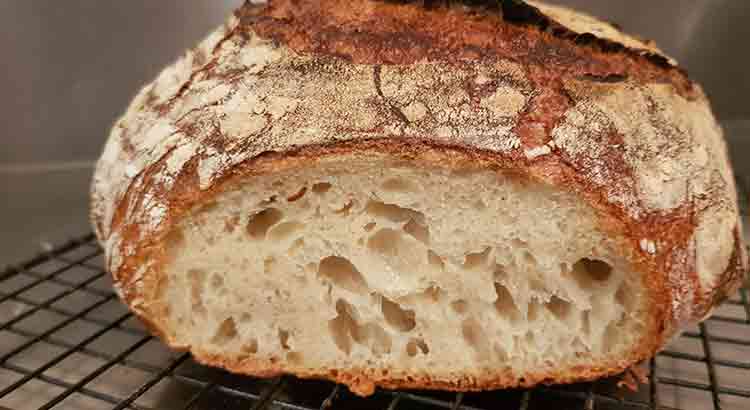Probiotics are what set apart sourdough bread from any other type of bread, this is a fact, but a very strange one because sourdough bread doesn’t contain any probiotics. This might be a little confusing so let me explain.
The sourdough starter does contain probiotics, but they don’t survive the baking process so the actual sourdough bread doesn’t contain any probiotics. But their positive effects are still present in the sourdough bread.
So, baking sourdough bread does indeed kill the probiotics, but the fact that they were there at some point will provide a lot of benefits. One more thing that you should know is that not all sourdough starters have the same probiotics, and their effects will be different. But before we talk about that let’s take a look at the general positive effects of probiotics.
The Positive Effects of Probiotics in Sourdough
As I said, there are no probiotics in the sourdough bread itself, as they aren’t able to survive the baking process, but all the work that they do before we bake the bread will still remain. And this is what makes sourdough bread so healthy and tasty.
Now let’s go over some of the most important things that probiotics do in sourdough.
- The Production of Lactic Acid
Lactic acid is what makes sourdough sour, and it’s also what gives sourdough bread its long shelf life and prevents the starter from molding.
The lactic acid is produced by the probiotics as a byproduct when they consume the sugar and starch found in the flour.
There are also quite a few health benefits that lactic acid provides, the most important being:
- Improving the gut health
- Boosting the nutrient absorption rate
- Acting as an antioxidant
Lactic acid is usually found in pickled vegetables, cheese, yogurt, cheese, and of course sourdough bread. So there aren’t that many foods that contain it.
- Decreasing the Phytic Acid Present in Wheat
Phytic acid is known as an anti-nutrient because it impairs the absorption of nutrients, like iron, zinc, and calcium.
Phytic acid is naturally found in grains and plant-based foods, so all types of bread contain some amount of phytic acid, it’s not something specific to sourdough, on the contrary, sourdough bread contains less phytic acid than other types of bread.
The probiotics found in sourdough drastically reduce the amount of phytic acid, thus making sourdough bread considerably richer in nutrients.
- Lowering the Glycemic Index of the Bread
All flour contains small amounts of sugar which increases the glycemic index. But because the bacteria and yeast in the sourdough consume the sugar in order to grow, the glycemic index of sourdough bread is considerably lower than any other type of bread, and the sugar levels in the blood will remain steadier.
- Pre-digesting the Flour
While not the most appealing fact about sourdough probiotics, it’s actually one of the main advantages.
In order to survive probiotics need to eat, in the case of sourdough they eat the flour. So basically sourdough is pre-digested, which makes it easier for our stomachs to digest it, as some of the work has already been done.
Why the Positive Effects Remain Even if the Probiotics Are Gone
All of the thighs that probiotics do before the bread is baked will remain in place. The lactic acid will remain in the dough, the phytic acid that they consumed is gone forever, the same thing applies to the sugar. So even if the probiotics are gone, what they did won’t be reverted by the heat of the oven.
In the case of sourdough, the benefits that probiotics bring are through the changes that they make to the dough itself, not by consuming the probiotics themselves.
Different Types of Sourdough Have Different Probiotics
The probiotics in sourdough come from the flour itself. So depending on what type of flour you will use, the probiotics that you will obtain will be slightly different.
But even if you use the same brand of flour every time the results will be slightly different, depending on where the wheat for the flour comes from, depending on how the weather was when the wheat was growing, etc. So it’s impossible to obtain the exact same probiotics at the same levels every time.
But one thing that you can easily control is the type of grain that the flour is made out of. And this will have a great impact on the probiotics in the sourdough.
Different grains have different properties:
- Low Sugar: if you are looking for sourdough with low levels of sugar amaranth, buckwheat and ragi are the best flours.
- Low Calories: Whole what flour is the flour with the fewest calories, closely followed by quinoa flour.
- Vitamins: If you want more vitamins in your sourdough bread you can use coconut or almond flour.
- Overall Best Flour: The overall best flour is considered Rye
- Flour to Avoid: In general you want to stay away from bleached flour, especially when you are just starting the starter. The problem with bleached flour is that during the bleaching process some of the good bacteria are destroyed, so they won’t have the chance to provide any benefit.
And remember that you can always combine different types of flour, but when you change the flour the starter will need a few days to adjust, so you might not be able to use it for a few days, maybe even a week.
You can feel free to experiment with your sourdough as much as you like, there are no bad combinations that could ruin your sourdough forever, just remember that it will need some time to adjust every time you change the flour.
Prebiotics and Fibers in Sourdough
Another very important aspect of sourdough that is closely related to probiotics are the prebiotics and the fibers.
Despite their name prebiotics don’t have that much in common with probiotics, as they are a type of fiber.
Probiotics that live in our gut need nutrients in order to survive and maintain our gut healthy, those nutrients come from prebiotics and other types of fibers. And when the probiotics feed off those fibers they produce nutrients for us.
Probiotics are known as soluble fibers because they can be dissolved, but sourdough bread also contains other types of fiber: insoluble fiber and resistant starch.
Insoluble Fibers, as the name implies can’t be absorbed or fermented by the gut, and it acts mainly as a bulking agent to help pass out all the waste. If you are interested in sourdough bread with lots of insoluble fibers you should try wholemeal.
Resistant Starch is a relatively new type of fiber that has been discovered to have a multitude of benefits. Resistant starch is also soluble.
Sourdough bread contains considerably more resistant starch than normal bread due to its long fermentation process, as the starch has more time to develop.
So if you are interested in bread with lots of fibers and probiotics you should definitely try wholemeal sourdough as it offers a lot more than its white counterpart.
Final Thoughts
Does Baking Sourdough Kill Probiotics? Sourdough starter does contain probiotics, sourdough bread doesn’t contain probiotics, as they can’t survive the high temperatures of the oven. But this is not a problem because the probiotics did their job while the dough was rising.
Now, let’s make a quick recap of the main takeaways of the article.
Probiotics are basically good bacteria, that:
- Produce lactic acid, which gives sourdough its taste
- Decrease the phytic acid, which stops your body from absorbing all the nutrients
- Lower the glycemic index, by eating the sugar that is naturally found in the flour
- Pre-digest the flour, which makes it easier for us to digest
While baking the sourdough bread the probiotics disappear, but all the good things that they did will remain.
Besides probiotics, sourdough is also a good source of prebiotics and fibers, which act as a food source for the prebiotics in our gut.
The prebiotics in sourdough are influenced by the type of flour that you use, so depending on what you are looking to get out of your sourdough make sure to choose your flour carefully:
- Low Sugar: if you are looking for sourdough with low levels of sugar amaranth, buckwheat and ragi are the best flours.
- Low Calories: Whole wheat flour is the flour with the fewest calories, closely followed by quinoa flour.
- Vitamins: If you want more vitamins in your sourdough bread you can use coconut or almond flour.
- Overall Best Flour: The overall best flour is considered Rye
- Flour to Avoid: During the bleaching process, some of the good bacteria are destroyed.

